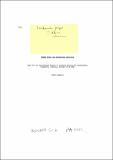| dc.description.abstract | Rapid change, past error, and the complex, diverse and risk-prone (CDR) farming systems of most smallholders combine to challenge normal
agricultural professionalism and bureaucracy. The transfer-of-technology
(TOT) mode which has served industrial and green revolution agriculture
misfits CDR farming conditions. The challenge is to reverse biases and
practices of normal professionalism, of top-down bureaucracy and of TOT. A
farmer-first (FF) approach puts first the knowledge, priorities and
analysis of farmers and herders, especially those who are resource-poor.
It seeks to enable them to gain sustainable livelihoods, often by
complicating and diversifying their farming and livelihood systems, and
reducing their risks. Multiple purpose livestock, with their linkages with
other elements in farming and livelihood systems, have a special part to
play. Practical implications include decentralisation, participatory
research, and changes in the behaviour and attitudes of outsiders. Three
questions stand out: whose reality counts - ours, or theirs?; who gains and
who loses?; and how can professionals change? | en_GB |

